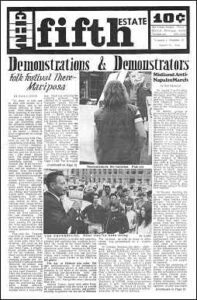Fifth Estate 12, August 15, 1966 Add to the Bookbuilder

CARR
The Protestors
What they’ve been doing
Demonstrations, peaceful and anarchic, planned and spontaneous, continue to reflect the mood of the times locally and across the nation. In this area, peace marchers paid their respects to the Dow Chemical Corporation’s NAPALM facility in Midland; anti-war and pro-war voices were raised at Campus Martius; and bricks were thrown at the TMU’s in the ghetto.
Mar 28, 2023 Read the whole text...
Ron Halstead
Midland Anti-Napalm March
On August 7 and 8 about 100 persons from cities in Michigan and Ohio gathered at Midland, Michigan, national headquarters of Dow Chemical Corp., to protest Dow’s participation in the manufacture of napalm.
On Sunday, groups of protesters distributed leaflets to churchgoers, calling on the people of Midland to be aware of their involvement in the deaths of people in Vietnam. In the early afternoon a rally was held in Central Park. This soon became an open forum as people from Midland came forward to voice their opposition to the making of napalm or to voice their support of its manufacture. Lane Vanderslice and Peter Steinberger of Ann Arbor Students for a Democratic Society fielded questions from the audience. One resident of Midland challenged the assertion that Dow is profiting from napalm and suggested that it may be losing money instead, to which Barbara Burris, of Detroit SDS, replied that Chemical and Engineering News of March 14, 1966, reported that Dow raised the price of its polystyrene shortly after they began using it in their new napalm.
Mar 26, 2023 Read the whole text...
Paula Stone
Folk Festival There—Mariposa
“To meet, to talk, and to sing with people on a human basis, this is the unique offering at Mariposa,” Mike Seeger mused while listening at the open-air concert Saturday night amongst a crowd of some 6,000 young people. “You can say something about the physical setting; it had good balance, good musical balance, but the main thing is the spirit—which is hard to generate at a large festival.”
Mar 26, 2023 Read the whole text...
John Sinclair
The Coatpuller
It’s good to be back with you again. The Festival Sunday was one of the most beautiful things I have ever experienced, and I think a lot of the people there had the same experience as myself. There were SO many people there, all day long, And everyone was really grooving. Joseph Jarman started the Festival off just after one o’clock with a spoken introduction and music trumpeter Peter Bishop (also of Chicago) and bassist Doug Riggs. The readings began with Dave Sinclair, J.D. Whitney, and Mike Litle, all of whom opened the people up for the biggest human sound ever to come out of Detroit—the Lyman Woodard Ensemble of the day, a totally integrated musical blast made up of Lymie at the organ, Jim Semark, piano and trombone; Ron English (Lansing), guitar; Doug Riggs and John Dana, basses; Byron Lyles (Lansing), drums; Charles Moore, cornet; Pete Bishop (Chicago), trumpet; Joseph Jarman (Chicago), alto saxophone and clarinet; David Squires, tenor saxophone; Jerry Younkins, tambourine; Bud Spangler (Lansing), tambourine; and, after the music started getting GOOD to me, I had to run home and get my own alto saxophone so I could get in there too.
Apr 2, 2023 Read the whole text...
Larry Miller
Larry Miller
This week, a record review concerning not fact, but opinion about Bob Dylan’s “BLONDE ON BLONDE”, (Columbia C2S 841). The current interview in these pages [FE #12, August 15, 1966] is covering the personal side of Dylan far better than anything I could write, so we shall instead talk about music. The main thing wrong with the record is the quality, or lack thereof, of the vocals. From the earlier Dylan records, particularly the last two rockers, we know that he is capable of sounding damn good when he wants to. The impression one gets is that he is sort of putting the listener down, trying to see how much he can get away with. Dylan is probably THE supreme individualist, and makes a point of not being what his audience expects him to be. However, when this protection of personal identity goes too far, it can and does detract from the art itself. What would have been a truly great recording is spoiled by the Rex Harrison manner of talking thought words, and the record is then merely good. The second point of criticism is based on Dylan’s apparent inability to grow musically. In spite of Dylan’s obvious genius as a lyricist, the inability to keep the musical idiom growing and changing detracts from the possible real greatness of this record. Apparently, in order to venture in to the rock field, Dylan felt it necessary to establish a certain sort of sound as a base, a musical framework. The truly exciting thing about this music (to me) is the search for new sounds, along with the expression of new ideas. In making BLONDE ON BLONDE he resorted to rather drastic measures to perhaps try to do something better with the music; he recorded in Nashville, used practically all new sidemen, but, with several exceptions, for the most part it sounds the same.
Apr 2, 2023 Read the whole text...
Bob Dylan
Paul Jay Robbins
Bob Dylan as Dylan
Part 3 of 3
Dylan, eyebrows up and lids down, spoke in intense staccato. He’d throw words out in rhythmic phrases, testing the articulation of his thought by speaking it. He would smoke distractedly, bob his knee as if dandling a kid, and diddle with his fingers...continually nervous. We’d been introduced by mutual friends and the talk had been straight and communicative for an hour or so. His nervousness wasn’t irritation, it was restlessness. Dylan is a quester, a grower, a doer; and growth is a nonsleep engagement.
Apr 2, 2023 Read the whole text...
anon.
Getting Used To It
You’re on. You’re moving. So now you read (if you can in a moving car), watch the countryside, wave at children, talk to any companions you may have, drink wine, write books, and groove train riding activities.
Now—even if you’re on a fast freight—if it’s going very far, the train is going to stop a couple little times to drop off and pick up cars. What you do, again—before you get off and very far away from your car—is ask one of the brakemen how long it’s going to be before the train pulls out again, so that you won’t get off and lose your train like I’ve done a couple of times.
Apr 8, 2023 Read the whole text...
Fifth Estate Collective
Those who Refused

On July 7, three American GI’s were arrested in New York City as they prepared to speak at an antiwar rally. Pvt. Dennis Mora, PFC James Johnson, and Pvt. David Samas, had, on June 30 held a news conference to announce that they had begun action in court to prohibit the Secretary of Defense and the Secretary of the Army from ordering them to Vietnam. With the belief that the war is “unjust, immoral and illegal” they stated that they would report to the Oakland Army Terminal in California on July 13 as ordered but they would refuse to board a ship for transfer to Vietnam.
Apr 8, 2023 Read the whole text...
Fifth Estate Collective
Socialist Scholars Meet In N.Y.
The second annual Socialist Scholars Conference will be held in New York at the Hotel Commodore, September 9–11, 1966. The noted historian and political analyst Isaac Deutscher and the social philosopher Herbert Marcuse will participate in a discussion “On Socialist Man” to lead off the Conference.
Apr 8, 2023 Read the whole text...
Frank Dedenbach
Folk Festival Here—Newport
Newport, Rhode Island is an old, almost dingy New England town whose saving graces are a beautiful Atlantic beach and the music festivals held every year there. The weather is hot in the day and cold in the night, but the inhabitants are cold almost all of the time. However, when a few thousand folk fans decide to bask in the afternoon sun for some musical workshops and to warm up the night and the town with some evening concerts and quite a few sleeping bodies in the park, folkies usually do it right.
Apr 8, 2023 Read the whole text...
Fifth Estate Collective
Reply from Defense Dept.
After two months of silence the Defense Department indirectly answered a request for information sent to them by the News Editor of the FIFTH ESTATE. The inquiry, sent June 1, involved a report in the VIETNAM COURIER (published in Hanoi) that a battalion of the 1st Infantry Division had attempted to desert in the midst of battle. (See article, FIFTH ESTATE, p. 6, July 15, 1966).
Apr 10, 2023 Read the whole text...
Various Authors
Letters to the Editor
We were delighted to receive your last edition and think that you have made some great improvements in the format.
It has occurred to me that your people might want to consider some of the issues that are being highlighted—such as civil rights, housing and displacement of people, poverty programs, employment of Negro youth, etc. Is it possible to highlight these problems? There are some real “nitty gritty” issues in Detroit that need to be brought out in the open and your people could provide a real means of communication.
Apr 8, 2023 Read the whole text...
Unclassifieds
AD RATES: 50 cents per line. Call 962–9334 with your message or stop by 937 Plum St.
WANTED—a multi-small-room apartment anywhere around Wayne — semi-cheap. If having one for rent—ring LI8-6434, ask for Larry Mahigian.
THE FIFTH ESTATE needs $500 dollars within one week after this ad appears. We’ve got soooo many bills. We can’t promise when you’ll get the money back, but we’ll work it out. If things go right and subscriptions, display ads and contributions keep coming in, I see a weekly ESTATE in Sept. or October. Stop in at 937 Plum St. and let’s talk about it.—the editor.
Apr 10, 2023 Read the whole text...
Fifth Estate Collective
ACLU Blasts Miscegenation Laws
The American Civil Liberties Union urged the United States Supreme Court last week to review the constitutionality of Virginia’s state laws making racial intermarriage a criminal act.
The civil liberties organization argued that the miscegenation laws violate the equal protection and due process clause of the Fourteenth Amendment to the US Constitution, the right of privacy, the right to marry, and civil rights provisions of the US Code.
Apr 10, 2023 Read the whole text...
Frank Joyce
Campaign ’66
The August second primary was almost enough to send one to the political physicists with their slide rules and computers to find out what happened. Why was it such a disaster?
But then we don’t really need political physicists to tell us what happened. We know. Racism, confusion, manipulation, “apathy” and one-dimensional politics happened. What happened is the logical consequence of a political system which for too long has never provided any alternatives for people beyond bright shining faces and good family men. The result is that people did not know that in a few isolated cases there were alternatives or didn’t believe them when they saw them or for other, more complicated reasons, rejected them.
Apr 10, 2023 Read the whole text...
